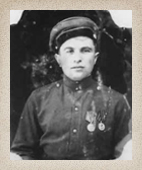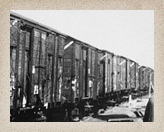
June 1941
On June 22, 1941, the war between Germany and Russia broke out. On the second day of the war, a general mobilization took place, during which hundreds of men were enlisted from Zurawno. There were many Jews among them.
There was a great deal of tension in the town and the Jews were very fearful about the coming of the Germans. The Ukrainians, however, waited for them as if they were liberators. They believed that Hitler would award independence to the territory of the Ukraine. On the fifth day of the war, the Russians began leaving the town. Young Jews, and especially those who had belonged to the Komsomol or the Communist Party, were anxious about the arrival of the Germans. Many such Jews fled eastward.
Many Jews wanted to leave the town but because of the chaos that reigned during those days, nobody had any real idea of what was happening. The Russian authorities guarded their future plans carefully; perhaps they too were unsure about their plans and when and how they intended to withdraw from the area.
Among the Jews who left was a group of about one hundred people, mostly men, who enlisted in the Russian army. My brother, Yakov, the second of the Laufer sons, was one of this group. The atmosphere was very tense when he came to say goodbye to my parents-it was almost one of mourning. From rumors that had reached us about the war, we learned that the chances of a soldier returning who had been sent to the Front were very few indeed. The parting from Yakov was very difficult, particularly so because Haim, their firstborn, had now been in the army for nine months and was somewhere on the Front.
Yakov was only nineteen years old but in all things he behaved like an independent adult full of self-confidence. We persuaded ourselves that he would be able to survive in even the most difficult conditions. But the horrors of war were printed indelibly on the consciousness of both my parents. They remembered only too well the experiences of World War I and the transition from the Austro-Hungarian to the Russian regime. The conquests of the Russians had been accompanied by acts of murder, rape, and looting.
That day of parting from Yakov gave me my first, forcible experience of war-the feeling of impotence in the face of a bitter reality, against which there was nothing to be done. My father wanted the whole family to flee eastward but this was not a practical possibility: even before the outbreak of war, our main source of livelihood had been taken from us. A pair of horses and a cart, which my father owned in partnership with my uncle, Solomon Diamant, had been ours until the Russians conquered Eastern Poland. On the second or third day of the war, the Red Army confiscated the two horses, so that we no longer had any means of transport. There were no trains that served the civil population and had we tried to escape on foot, the Germans, equipped with transport, would have easily overtaken us. The Germans in fact made their way from Przemysl to Zurawno, and eastwards beyond it, in five days.
Photo: Yakov Laufer, a Jewish soldier from Zurawno, served in the Red Army (photo dated 1942).
Reprinted from The Fields of Ukraine: A 17-Year-Old's Survival of Nazi Occupation; The Story of Yosef Laufer by Haim Tal (Dallci Press 2009), with permission granted by Dallci Press on March 28, 2010.

